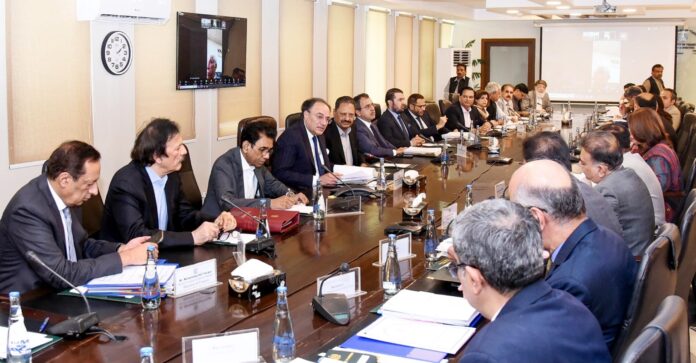The Economic Coordination Committee (ECC) on Tuesday approved a series of strategic allocations and policy measures aimed at strengthening Pakistan’s defence, internal security, food management, and petroleum exploration sectors. Chaired by Finance Minister Muhammad Aurangzeb at the Finance Division, the meeting brought together federal ministers, special assistants to the prime minister, secretaries, and senior officials from relevant ministries and regulatory bodies.
The committee approved a Technical Supplementary Grant (TSG) of Rs50 billion for a range of Defence Services projects, coming shortly after a surge in terrorist attacks that have rattled the country, including a recent assault on Cadet College Wana and a suicide blast outside the district court in Islamabad’s G-11 sector that left 12 people dead and 36 injured. In addition, the ECC sanctioned Rs100.3 million for the maintenance and repair of defence equipment used by the Federal Civil Armed Forces, ensuring operational readiness of key law enforcement and security machinery. A further Rs841.56 million was approved to support border management operations, internal security, and law-and-order maintenance by the Federal Civil Armed Forces, with officials noting the funds would enhance nationwide security measures and bolster border infrastructure.
On the food security front, the ECC approved the establishment of a Special Purpose Vehicle (SPV) to oversee the structured closure of the Pakistan Agricultural Storage and Services Corporation (PASSCO). The SPV will operate with an initial paid-up capital of Rs1 million and is expected to manage procurement reforms, supply-chain restructuring, and efficiency improvements as part of the winding-down process. Officials said the move is aimed at streamlining the organisation while maintaining continuity in agricultural services, reflecting the government’s broader focus on restructuring state-run enterprises.
The committee also approved measures to incentivise foreign participation in Pakistan’s petroleum exploration sector, including extensions of license periods and assignment of working interests for offshore oil and gas blocks. In a major development, Turkish Petroleum Overseas Company (TPOC) was cleared to take operatorship of the Eastern Offshore Block-C, with Pakistan Petroleum Limited reducing its stake to 35%, while Mari Energies and the state-run Oil and Gas Development Company hold the remaining shares. Finance Ministry Adviser Khurram Schehzad said the block contains a drill-ready prospect and added that the transition is expected to bring international technical expertise, enhance operational efficiency, and attract fresh foreign investment, advancing Pakistan’s pursuit of energy security.
Officials highlighted that this approval is part of a broader effort to revive Pakistan’s offshore energy potential. Since independence in 1947, only 18 wells have been drilled in the country’s 300,000-square-kilometre offshore zone, which borders Oman, the United Arab Emirates, and Iran. The ECC’s approval follows the first offshore bidding round since 2007, in which 23 of 40 offered blocks covering roughly 53,500 square kilometres were awarded to investors. Observers said the approvals signal a push to attract more foreign participation, bring valuable operating experience, and enhance technical capabilities in the energy sector.
The ECC meeting was attended by Petroleum Minister Ali Pervaiz Malik, Planning Minister Ahsan Iqbal, Special Assistants to the Prime Minister, federal secretaries, and senior officials from the concerned ministries and divisions. Analysts said the decisions demonstrate the government’s commitment to reinforcing national security, modernising agricultural operations, and encouraging foreign investment in strategic sectors, all during a period of heightened national concern.




